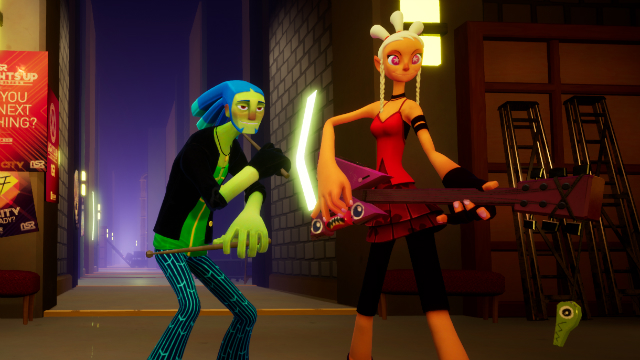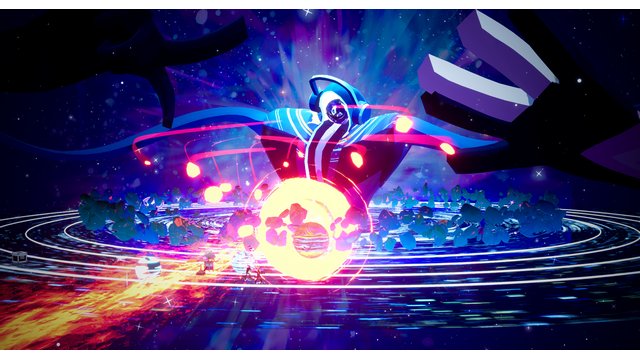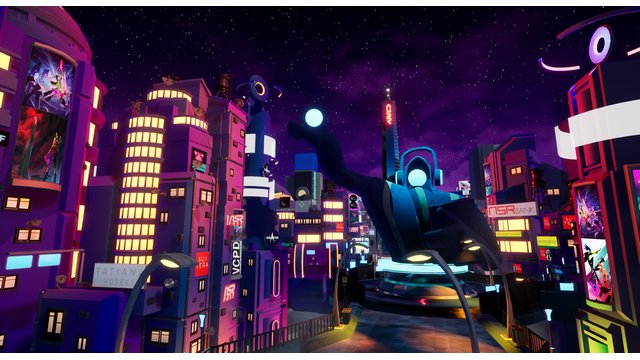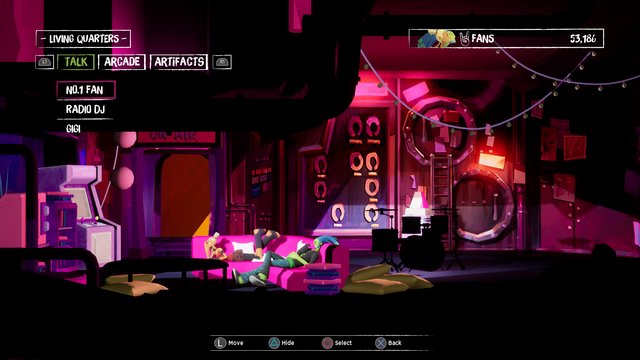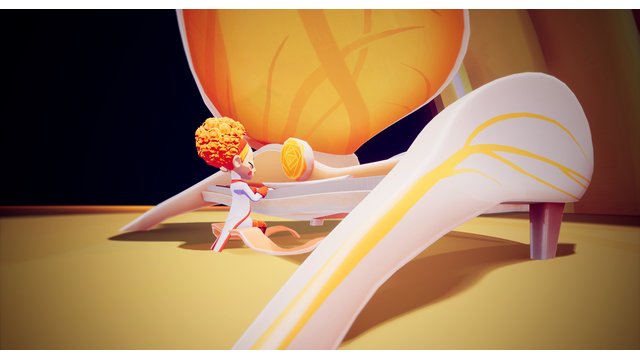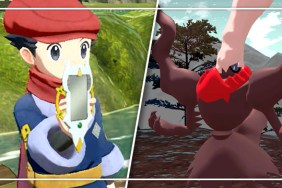I got a chance to sit down at E3 2019 with Wan Hazmer, co-founder of Metronomik and developer on No Straight Roads. I got a chance to play a bit of the game and chat with Hazmer about the game’s development and some of the systems that set it apart from other action games.
I had a blast playing the game and its unique mixture of action and rhythm gameplay makes it stand out amongst its indie peers. In the demo I faced off against DJ Supernova, who tried his best to give me the disco plague. He’s just the first of the many bosses that will be in the game, and even though it’s the beginning of the game, he still posed a challenge. You can find out more about No Straight Roads in the interview below.
GameRevolution: So what’s No Straight Roads about? What’s happening on the game.
Wan Hazmer: In No Straight Roads you control an indie rock band and try to topple an EDM empire. So the EDM empire is called No Straight Roads, which is also the name of the game. So the name of the game is the name of the villain. And, what you have to do is you have to hijack their concerts because you are rebelling against the system where the EDM empire is preventing everyone else apart from their artists to perform music. So you have to fight them with the power of rock. It’s a music-based action adventure game for the PC and PlayStation 4.
GameRevolution: So we fought a boss in this demo. Are there regular levels or do you just go from boss fight to boss fight?
Wan Hazmer: So, there’s a hub, and from there you have to choose which concert hall you want to hijack, and after that, you will actually go through, I wouldn’t say it’s a full-fledged dungeon like Persona, where you spend many, many hours in it. It’s more like arrests Rez. So you spend like maybe 15 minutes on the approach to earn your right to hijack the concert, and then after that, you’ll face the boss.
GameRevolution: What’s the approach part like?
Wan Hazmer: So haven’t revealed that yet. But, mostly, attacking mobs and also the mobs attack and also defend depending on the music. It also gives you a hint of what the boss will do. Also cause I kinda like the Nintendo techniques or you know, to introduce small elements here and there before we get to the actual boss because when we looked, we saw that sometimes in the boss fight, some people do struggle with understanding what’s happening with the stage show. We are hoping that the approach will help with that.
GameRevolution: You mentioned during the demo that you don’t have to really follow the rhythm. You can play the game as you want. If you attack with the rhythm, do you get a bonus to your attack?
Wan Hazmer: So, uh, the way we do it is, um, I guess you know Crypt of the Necrodancer, right?
GameRevolution: Yeah.
Wan Hazmer: The microphone and say, right, yeah, yeah. So you have to press obviously getting more benefits if you press buttons according to the beat. Uh, we are actually treading a very delicate balance between trying to get every gamer to play the game versus the pleasure of following the beat. I mean, I would imagine that there are some people who don’t even intend to follow the beat, but when they know that they have to follow the beat, you know, to get some benefits, they will feel pressured. So, we are trying to make sure that we remove that pressure by having the parryable attacks.
So then you see the parryable attacks then, you understand that you can follow up with them in this case scenario. For now in the demo, because this is the first boss, so there are a lot of attacks that have more visual cues. So you actually see a whole ring with arrows before the planet spinning, right? But, in later bosses and even in the higher difficulty of that boss, you will find out that you will be relying more on audio than the visual. So for example, we actually showed another boss, at Tokyo Game Show last year. So we had a bomb reticle on the floor. So usually in other action games, it would blink before the bomb drops. But, we don’t make it blink at all, you have to listen to the music to be able to understand when the bomb is going to fall.
So yeah, these are the little things we are, we want to constrain the way you interact with the music, but at the same time also reduce the pleasure of doing that. And, then after that, we increase the more stuff that you can enjoy the music. So, for example, with the DJ Supernova boss fight, once you clear the normal mode, you can actually challenge different other modes. So it’s not like a new game plus kind of system more like Sonic or racing games. Right. The harder versions will have you having two parry, almost everything to survive.
GameRevolution: So ideas like if someone hasn’t played a rhythm game, you want to start them with visual cues and then wean them off of that onto using the beat?
Wan Hazmer: Yep. For me, the ideal situation is once they clear the game, they just realize, “Hey, I actually have rhythm sense.”
GameRevolution: What are some of your favorite rhythm games? What gave you the inspiration behind No Straight Roads?
Wan Hazmer: Oh, okay, here we go. So I’ve played rhythm games since the original Beatmania, so is this a long, long line of games? So I usually separate them into casual and hardcore. So for hardcore, actually it is a game in Japan called Chunithm. It’s a touchscreen game, but you have to raise our hands and all that as well. That game is really amazing. I used to play a lot of Pop’n Music. For the casual part of it, my favorite is actually Rhythm Heaven and also story-based music games. Like for example, Elite Beat Agents, Space Channel Five and also Gitaroo Man.
GameRevolution: Around how long do you envision the game taking to beat and, how many stages do you hope to have?
Wan Hazmer: Well, the number of stages is already fixed, but I can’t mention it because it might be a spoiler. I can say that you can play for around 10 to 15 hours.
GameRevolution: And, you mentioned different difficulty levels, so there’s some replayability there.
Wan Hazmer: Yeah, if you love your rock, because you only hear rock towards the end when you’re winning, so you’re going to hear, there’s a rock mode, and you can play the entire stage in rock.
GameRevolution: Can you explain a little bit more about how there are three tracks for each stage?
Wan Hazmer: So there actually three channels for every boss fight: backing, melody, and rhythm, and we will multiply that with a metrics of three genres, so rock, EDM and a boss specific genre. So in the case of the demo boss, it was disco. Depending on the situation, like HP or even the distance to the boss, we would change one of the channels to rock or EDM. If the boss is very powerful at the moment, we switch all the channels to EDM and if you’re kind of winning, but not yet, we just switched one of them to rock. So for every boss fight, we had three genres that we have to compose. So it’s amazing because we have a really great line of composers for them. So we have Falk Au Young, who was the mixing engineer for Final Fantasy XV and also Kingdom Hearts as well. I was lead game designer on Final Fantasy XV, so I used to work with him. Have you played FFXV?
GameRevolution: Yeah, I loved it.
Wan Hazmer: Okay, so you know Hammerhead? When you enter the diner, the music changes a bit. We have always been big about dynamic music. We also have James Landino, who’s taking care of the EDM portion on the track. He was a composer for Cytus 2, and Sonic Mania. We have Pejman (Funk Fiction) who is doing the funk part and also using the rock pile. And, the beauty of all this is that they understand the technicalities of dynamic music. They are very involved with the game design process. So, for example, you know, um, conceptually there’s one boss fight where we have a piano genius, she’s a kid, and she has an overprotective mother behind the curtains, then there’s you. So the kid will be classical, the mother will be EDM, and you’ll be rock. So, depending on the power balance of the stage, we will change accordingly. And, the composers know that and try to, you know, adjust the composition based on the stage. A lot of involvement for compositions. Usually, it’s always the game is finished. I say, “Okay, can we have the music? Thank you very much. Bye.” You know, that’s not the case for this one.
GameRevolution: About how long has No Straight Roads been in development?
Wan Hazmer: Uh, I left Square Enix November 2017, so I started December 2017 like one and a half years.
GameRevolution: So it’s coming together pretty quick.
Wan Hazmer: Yes. Um, you know, I always believe in agile methodology, you know, so yeah, I mean obviously when you make a triple a game it takes years, so I’m trying to my best to make sure that it doesn’t become a decade. I want my people, my teams, to have a really great portfolio, you know, it can be tough to work on the same team for five years, especially for a team like ours that consists mostly of fresh graduates. So they can develop something real quick and then, you know, then they can put that in their resume.
GameRevolution: How big is the team working on No Straight Roads?
Wan Hazmer: It’s around 30 people, including freelance.
You can play No Straight Roads when it releases on PC and PS4 sometime in 2020.
